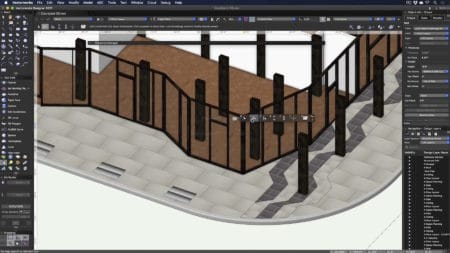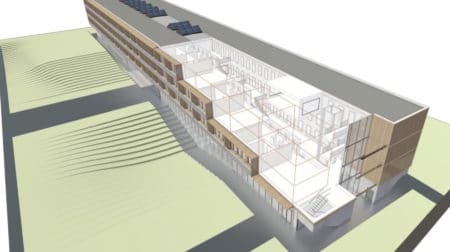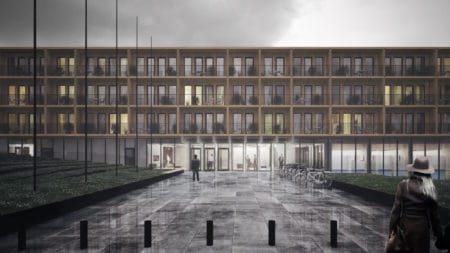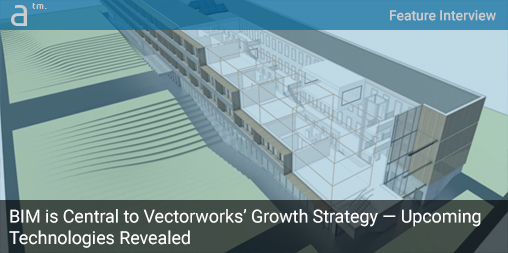RECENTLY I HAD A CHANCE to see the Vectorworks Design Summit virtual keynote, an online event in lieu of this year’s canceled user conference. Both the keynote and my post-interview with CEO Dr. Biplab Sarkar revealed a clearer picture of how Vectorworks is both growing organically out from its core base of users into vertical segments, and how BIM technologies play a central core role for creating competitive advantages for various “verticals.”
The Remote Reality
While the user conference, called the Vectorworks Design Summit, was shuttled, arguably one of the most valuable parts—the CEO keynote devoted to showing a roadmap for the platform—was not. I asked Dr. Sarkar about the impact the global pandemic may have on their technology road map.
“It is something we are thinking about, but also doing something about,” says the CEO, who, before taking the company reigns from the previous CEO was its long-time chief technology officer. During this unprecedented time in modern history, hundreds of thousands of AEC professionals around the globe are designing, detailing, building, and operating buildings and infrastructure in the context of social distancing and remote work. This has put new kinds of pressure on IT infrastructure and software systems. For example, Dr. Sarkar says a challenge today is that BIM files can get quite huge, and a new challenge given over-stressed Internet infrastructure is sending data to the master Project Sharing files in the context of how Vectorworks operates.
In his virtual keynote, Dr. Sarkar and this team announced several BIM technologies that will help architects perform better in the pre and post-pandemic contexts. A new Project Sharing Server is arriving with the upcoming Vectorworks 2021; it will be a service and a tiny app you install on your LAN. Also, in current versions, change management technology is being improved and reworked with some urgency due to the present context. “Sometimes, this can lead to some quality issues,” he says, “that is something we are working on very quickly now because of the current situation.”

A glimpse of the Vectorworks future with brand new UI-UX features that will greatly modernize BIM workflows. (Image: Vectorworks Inc. / Architosh. All rights served)
In the present context, performance is more critical than ever. Dr. Sarkar said the company works daily with the Siemens Parasolid modeling kernel development team, discussing optimization and parallelization of code in their modeling kernel. “We are working with them daily to get to the point where it [Vectorworks] is really going to fly.” He notes that users will see some of these improvements in the 2021 release this fall. Multi-core CPU optimization has two fronts for the company. One front is the work on the Parasolid modeling kernel—which is literally coded by the Parasolid team itself—and the other part is taking the Vectorworks code to multi-cores. The company is aggressively doing both.
Big BIM
Vectorworks’s success in its verticals, mainly its Vectorworks Spotlight product for the entertainment design industry, can cause observers and users to wonder if the company can still advance its technology for architects at the pace it demands. New technologies coming up will squarely put those worrying concerns to bed.
The company has announced multiple BIM-centric new features and technologies are coming up that will please its long-term core Vectorworks Architect users. For 2021, Vectorworks gains not only a new Project Sharing Server but 3D structural grid technology, especially critical for large building design under BIM. The roadmap also looks to add import/export support of Excel, and most critically, true Materials support. Future versions will see IFC support for Energos and updates to the Structural Member tools.

Vectorworks continues to advance on the Big BIM front with many of its international customers, in particular, already utilizing the BIM software on increasingly large projects. (Image: 3+1 Architects, Estonia / Architosh. All rights reserved.)
Dr. Sarkar says, “We have never had actual materials, we’ve always had textures. But Materials come with real properties and can be assigned to components of a wall, roof, or slab.” This means, for the first time, real accurate “take-offs” will be possible. Dovetail that with support of the Excel file format, and architects and AEC users will have a powerful means for costing out projects.
For the future releases, Vectorworks will add Multi-Building Support, Stacked Wall Components, Renovation-Phasing, and Unit Plans technologies. On the Renovation-Phasing features, Dr. Sarkar says, “what this new feature does is assign ‘status’ to objects in the BIM model.” With objects gaining a ‘status’ field in the backend of the program, it means visualization and automation of program features can determine outcomes based on that status.
We are working with them daily to get to the point where it [Vectorworks] is really going to fly.
Other future focuses will include a wholly revamped Walls Tool technology. In Architosh’s monthly newsletter (Xpresso) two months back, we incorrectly said the new Walls Tool was upcoming for Vectorworks 2021, but in fact, it is planned for a future release. The new Walls Tool will enable users to gain far more control over dealing with uncommon and custom situations, allowing individual layers of the wall—particularly finish layers—to self-terminate at openings and other wall conditions as the architect desires.
Another item we shared in Xpresso—in our advanced peek at some of our conversation with Dr. Sarkar—was that Apple’s Metal graphics API would partly power Vectorworks on the Mac. This means accelerated graphics using a more bare-metal method of programming graphics. (see: Architosh, “Khronos speaks to Architosh about the new Vulkan”, 13 May 2015 for a larger conversation.) Additionally, OpenGL will likely entirely be replaced by Metal for Vectorworks for Mac at some point in the near future. This will further increase accelerated performance, which is a big win for Mac users, making up half of all Vectorworks users.

Vectorworks’ current and near-future integrations with top rendering tools, from Enscape, Lumion to Twinmotion, provide a supplement of advanced rendering options on top of the internal rendering engine from Cinema 4D. (Image: 3+1 Architects, Estonia / Architosh. All rights reserved.)
Windows users are not necessarily missing out on graphics acceleration using low-level driver overhead graphics APIs like Metal and Vulkan. While internal debates are still deciding a course of action, the Windows version of Vectorworks will most likely be accelerated with Microsoft DirectX API or the open industry-standard Vulkan API. They may even opt to stay the course with OpenGL on the Windows version a bit longer, but at some point soon, a low-level overhead graphics API will enter into the Windows picture for Vectorworks.
next page: Integrations and Further BIM-ness




Reader Comments
Comments for this story are closed